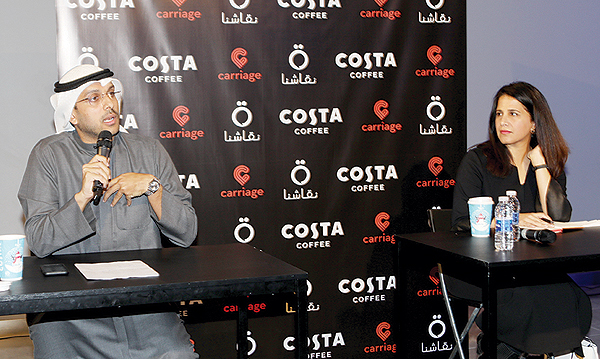
KUWAIT: Kuwait, a conservative Muslim country, allows Christians to practice their faith and there are several churches in the country. On a social level, however, some view celebrating non-Muslim holidays as an invasive foreign practice. Although no statistics are available, there is anecdotal evidence to suggest that more and more Muslims in Kuwait are celebrating the social and cultural aspects of Christmas. This has led to pushback from some who view this celebration as wrong.
Niqashna, a local community platform, organized a debate Tuesday evening around this theme: "Merry Christmas: Are foreign holidays endangering our identity?" Dozens of attendees came to hear the two speakers - one for, one against - offer their views on the impact the celebration of Christmas in Kuwait is having on society.
Speaking against, Mohammad Al-Sadani, an Arabic language instructor and TV broadcaster, argued that the celebration of Christmas, even as only a cultural practice without any religious meaning, is harmful to the Kuwait identity.
"The identity is all about our culture, religion, language, clothes… We should believe in the importance of our identity as Muslims and Kuwaitis," Sadani said, noting that most foreign holidays do not relate to Kuwait's traditions. "We do not have to celebrate the pure religious concept of the celebration about the birth of Jesus and Christianity."
"What is the role of the government in protecting our identity?" Sadani wondered. He also complained that the government has allowed the installation of Christmas trees in some areas including Ahmadi, arguing that this goes against Kuwait's Muslim identity.
Speaking for, Dr Sheikha Al-Jassem, Assistant Professor of Philosophy at Kuwait University, said that Kuwait's identity is more inclusive and does not forbid the celebration of Christmas holidays. "Our identity is dynamic, always changing," she said. "Our Kuwaiti identity changed by time, where we are not all originally from Kuwait, but we came from different backgrounds and religions. Therefore, we have to accept the differences among us."
"The danbora dance is originally from Africa. Our biriyani dish is from India," she added. "The Kuwaiti culture is a mix from everywhere when international trade was one of Kuwait's main sources of income before oil. All of these are Kuwait's identity. We cannot choose who is wrong or right. We cannot change the fact of the changing elements of our identity. The identity remains the same even when we celebrate other holidays. That does not change anything. Christmas is about celebrating the winter. The tree is a symbol of life remaining green in spite of the cold world outside."
The audience seemed divided, with many supporting the right to celebrate Christmas as a cultural tradition and practice, but others also clapped when Sadani noted that the pervasive growth of English had begun to erode the role of Arabic in the society.
Christmas as a holiday has long been a controversial topic in Kuwait. In previous years, members of parliament have complained about the sale of Christmas trees in shops and Christmas decorations in local malls. At the same time, there are more than three million expatriates in Kuwait and a large segment of these are Christian or from Christian backgrounds, while shops, restaurants and malls often decorate their premises in acknowledgement of the holiday.
By Faten Omar







